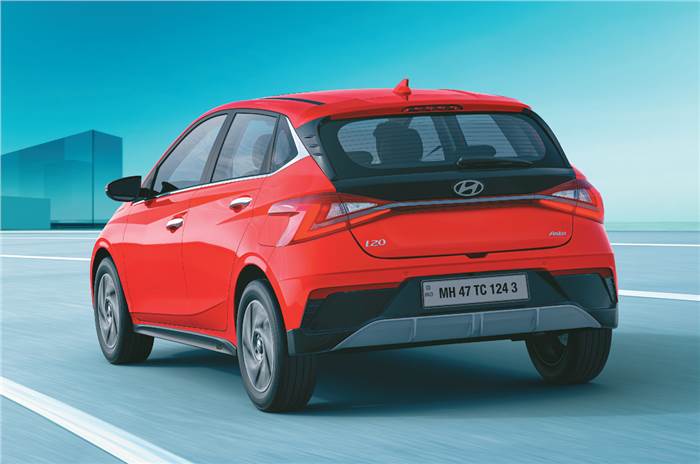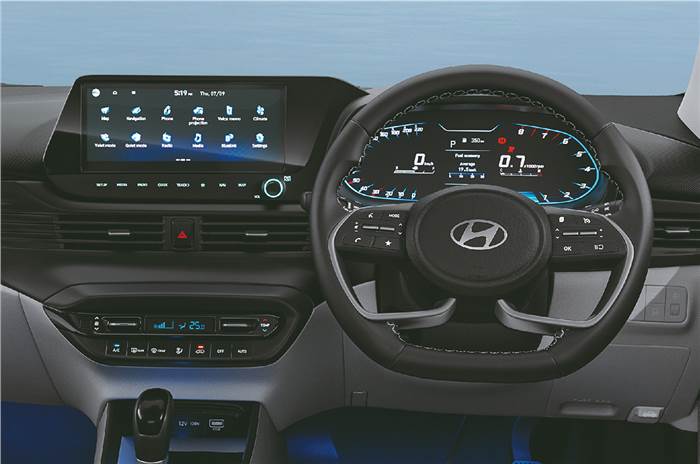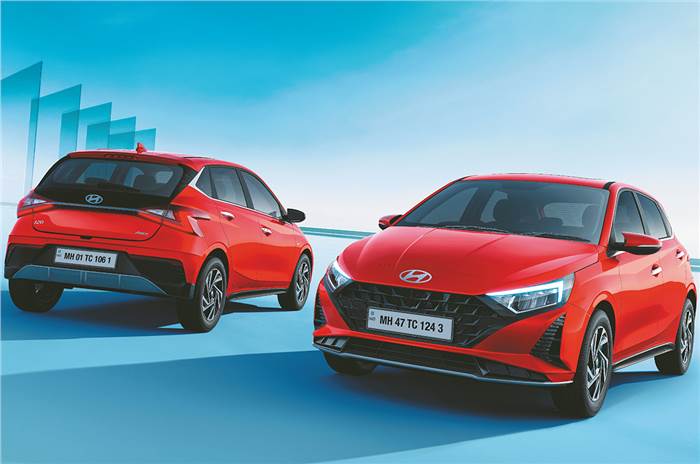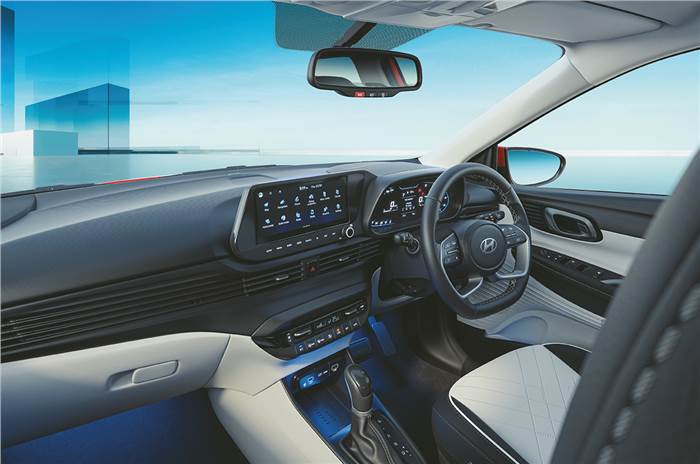Following a slew of teasers, Hyundai has now launched the i20 facelift in India, with prices starting from Rs 6.99 lakh, going up to Rs 11.01 lakh (ex-showroom, India). The i20 facelift sports revised front- and rear-end design, a new colour scheme for the interior, along with some new features, and is now available only with the 1.2-litre naturally aspirated petrol engine.
- i20 facelift gets new front and rear bumpers
- Interior gets a new grey and black dual-tone finish
- Currently only available with the 1.2-litre petrol engine
The i20 is now offered in five trims: Era, Magna, Sportz, Asta and Asta (O). Here's a detailed look at the prices of the i20 facelift:
| Hyundai i20 facelift price (ex-showroom) | |||||
|---|---|---|---|---|---|
| Era | Magna | Sportz | Asta | Asta (O) | |
| Petrol MT | Rs 6.99 lakh | Rs 7.70 lakh | Rs 8.33 lakh | Rs 9.29 lakh | Rs 9.98 lakh |
| Petrol CVT | - | - | Rs 9.38 lakh | - | Rs 11.01 lakh |
The base-spec Era is a new trim on the i20, thereby also bringing down the starting price by Rs 47,000 over the Magna trim of the outgoing model. Depending on the trim, the i20 facelift commands a premium of Rs 20,000 - Rs 27,000 over the outgoing model.
Hyundai i20 facelift exterior design
The updates on the i20 facelift are just to the soft plastic parts. The internals of the front grille sport a new design, and it also has a prominent black surround that connects it with the headlamps. Speaking of which, the headlamps are now full LED units on the top-spec trim, and get a revised LED daytime running lamp signatures, although the overall shape has remained unchanged. Additionally, the Hyundai logo has now been repositioned from the grille to the base of the bonnet, and gets a new 2D design.

The front bumper also gets two large arrow-shaped inlets on either side, but it now misses out on fog lamps. Lastly, the front chin has been revised with a more prominent splitter-like element. There are no major changes in profile, but it gets a new design for the 16-inch alloys. At the rear, it gets a revised bumper with a more prominent dual-tone finish, repositioned reflectors, and a faux-silver skid plate.
The new Hyundai i20 is available in a new Amazon Grey paint shade, along with the previously available Atlas White, Titan Gray, Typhoon Silver, Starry Night, and Fiery Red colours, and dual-tone options of Atlas White + Black Roof, and Fiery Red + Black Roof.
Hyundai i20 facelift interior and features
There are no major changes to the interior design, although it gets a new dual-tone black and grey finish for the dashboard and the semi-leatherette seat upholstery on the top-spec trim. The all-black interior on the outgoing i20 robbed it of a sense of space, so this should fare better in that regard. Hyundai has also added a new physical knob for the volume control at the base of the touchscreen, which was previously operated via haptic touch buttons around the same place.

The i20 facelift also gets revised ambient lighting, leatherette padding on the door armrests, puddle lamps with welcome function, and Hyundai’s ‘Sounds of Nature’ feature. Elsewhere, it continues with the 10.25-inch touchscreen, all-digital instrument cluster, Apple CarPlay, Android Auto, seven-speaker Bose sound system, wireless phone charger, single-pane sunroof, and automatic climate control. There’s also 60+ connected features, OTA updates, voice commands and Type-C charging ports.
Standard safety features include six airbags, ABS, EBD, ESC, hill assist control and three-point seatbelts and reminder for all seats. It also gets a reverse parking camera, TPMS, and automatic headlamps with escort function. Hyundai is offering a three-year/ 1,00,000km warranty, with the option of extended warranty.
Hyundai i20 facelift engine, specs
The i20 facelift is now available with a sole petrol engine – a 1.2-litre, four-cylinder naturally aspirated unit, mated to either a 5-speed manual or a CVT transmission. It produces 83hp with the MT transmission and 88hp with the CVT, and 115Nm of peak torque.
Interestingly, Hyundai has now discontinued the 120hp, 1.0-litre, three-cylinder turbo-petrol engine from the regular i20. It was offered with either a 7-speed DCT or 6-speed iMT transmission. The turbo-petrol motor will make a comeback with the i20 N Line facelift, and will be reserved only for this performance-oriented model, as was confirmed to us by Hyundai India. A launch timeline for the i20 N Line facelift is yet to be revealed. Hyundai had already discontinued the diesel engine on the i20 in the transition to the BS6 Phase II emission norms.
The i20 facelift continues to rival the likes of the Maruti Suzuki Baleno, Toyota Glanza and Tata Altroz.
Also see:
Tata Nexon.ev facelift revealed ahead of September 14 launch
MG Astor Blackstorm edition launched at Rs 14.48 lakh









Comments
Member Login
Personal Details
Rajesh Gowdar - 568 days ago
Bad luck Jeep , wrong timing .....Govt of India planning additional +10% GST on Diesel cars !!!!